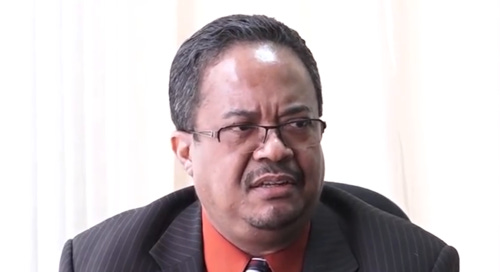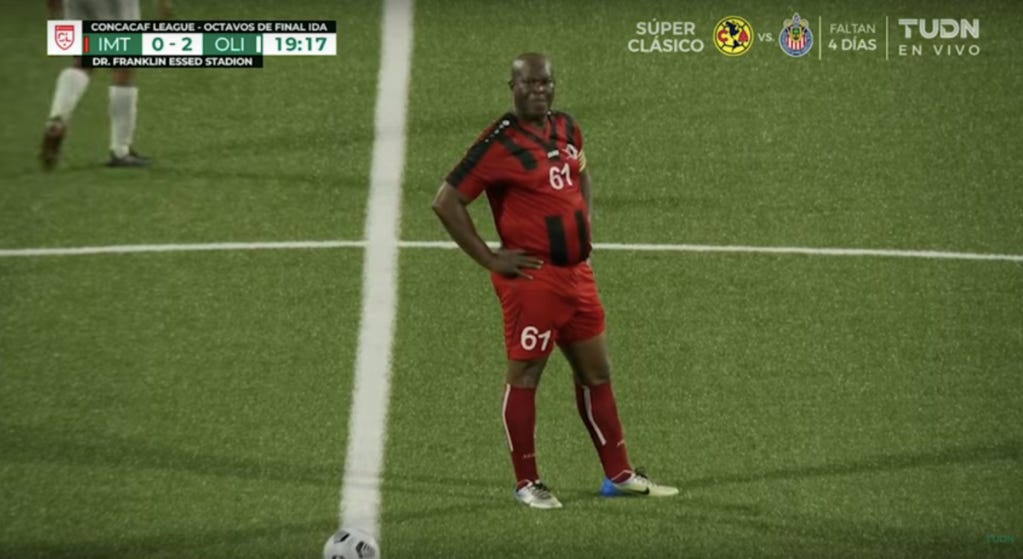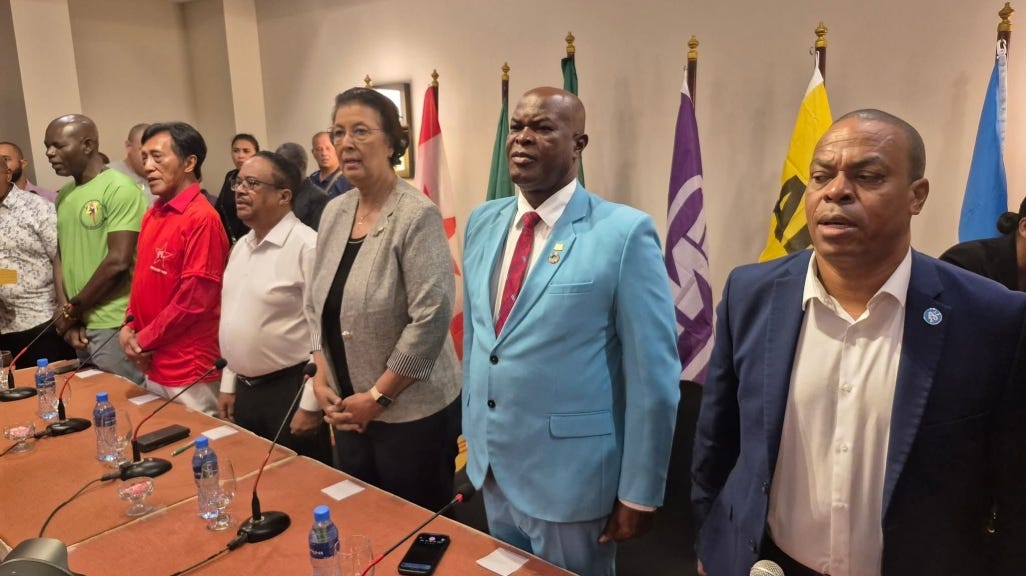More foreign affairs in a crazy, mixed-up world
Surinamese election update: nothing definite yet, but corruption charges are flying
I have been waiting for weeks now for a definitive announcement of the final results from the May parliamentary elections in my favorite sad-sack democracy, Suriname. To my knowledge, the results have not yet been certified by the government—no real surprise there, in a country where nothing works very quickly or very well without enough money changing hands first—but this week I came across one report on Caribbean.com that surprised even this old cynic.
The election itself was a tight one—what’s left of the ruling coalition of President Chan Santokhi took it on the chin, losing perhaps 3 seats in the 51-seat Parliament, and with that, its fast-fading chances to be anything except an opposition party when the new National Assembly meets to establish itself. Meanwhile, the old NDP party of much-reviled former dictator Desi Bouterse seemed, in the days after the election, to be gathering unstoppable momentum—outpolling Santokhi’s VHP “reformists” with 18 seats, and announcing a broad coalition of every non-VHP seat-holder—16 in all, provisionally—in the next Parliament.
If such an NDP-led coalition stands, it would hold the minimum 34 seats it needs long enough to elect Dr. Jennifer Geerlings-Simons as the next president—that is, the exact constitutional two-thirds of 51 seats. The retired physician and longtime speaker of the parliament is poised to become the first woman president of Suriname—and on the surface, at least, certainly a more sensible alternative than most of the angry, crooked, and short-sighted men who have been running Suriname into the ground for much of the past 50 years.
But there are still a few big “ifs” on the road ahead to her selection, as Caribbean.com pointed out in its recent article on the electoral aftermath. And one of them involves how much money is being offered to a small group of future parliament members to switch over to sign up with Santokhi—and conceivably give him a second term, by forcing the NDP into a grand coalition with the VHP instead. (More on that later …)
Surinamese President Chan Santokhi, perhaps out in the cold after one term. Public domain photo
A page back in time ... is a reader-supported publication.
To receive new posts and support my work,
consider becoming a free or paid subscriber.
* * * * * * *
Apparently, “massive inducements in American dollars have been offered to incoming lawmakers, who will vote internally for the top two constitutional positions towards the end of the month.” Figures as high as US$5 million are being bandied about in the media, at least—chicken feed, comparatively speaking, if the billions in oil royalties awaiting the winner of this government sweepstakes are any measure.
In early June, “Bronto Somohardjo, the leader of the Javanese-supported Pertjajah Luhur party with its two seats, says offers of bribes to form a coalition with the VHP and keep it in power abound at the moment.” He told local television station D-TV Express that “the stakes are high. Do you love your country enough, or do you love your pocket? Because amounts of 1 million dollars, 2 million dollars, 3 million dollars, 4 million dollars, and 5 million dollars are offered. But if you commit treason, people know immediately that it is you, 100,000 percent.”
[See “Bribery scandal casts shadow,” June 12, https://www.caribbeanlife.com/bribery-scandal-casts-shadow-over-suriname-government-formation/ .]
In that same article, Geerlings-Simons was quoted as acknowledging the developing scandal, as well. “We get a lot of news about bribery. In fact, we have information that people are being offered a lot of money. And that’s a shame … This is a serious form of corruption when you buy people’s votes. But yes, it is said, and I don’t have it in black and white. So, we hope it is not true,” Simons said on the radio program Bakana Tori, led by notorious propandist Clifton Limburg.
Limburg’s program was closely linked to the Bouterse regime from 2010 to 2020, when Bouterse was serving as the country’s president—and Geerlings-Simons, of course, was speaker and Bouterse’s head water-carrier in the Parliament. That the new head of the party, since 2024, is now even allowing herself to be quoted on the show—much less giving an interview—is perhaps disconcerting to observers who see her as beyond reproach, a real force for change. Most politicians ran from Limburg when they saw him coming with his microphone; they couldn’t afford the bad press from just being on his show.
The good doctor herself resigned from the National Assembly in 2020 after decades in the limelight, forsaking politics permanently, so she said, after Santokhi’s VHP-led coalition assumed power. And she only came back, so they say, when she was promised a free hand in running the party—even before the fugitive Bouterse, evading a 20-year murder sentence in prison, was officially out of the picture. (He died, fortuituously, in December 2024, or his inevitable pardon would be tops on her new agenda.)
Meanwhile, Santokhi himself says bribery offers have also been made to his MPs to further increase the NDP-led coalition’s seats. “Members of the VHP have also been approached with financial and material offers in an attempt to buy their conscience. These actions are not only a direct attack on the integrity of parliament but also on the democratic choices of the Surinamese people.
We strongly condemn these attempts and call for vigilance and transparency within all political ranks. The VHP is not a party that bows to pressure or money. We are founded on principles, on fair representation and on serving the people. Our parliamentarians stand firm. They cannot be bought—not for a position, not for a privilege, and certainly not for political manipulation.
But just who is offering all that money—and who is considering taking it—are questions on the lips of almost everyone in Paramaribo these days. Corruption is an easy charge against almost anyone ever associated with this country’s notoriously venal politics—even Geerlings-Simons—given the state of political affairs in the small and nearly-bankrupt country, now a virtual pawn on a strategic chessboard between the United States and China with oil royalties on everyone’s minds.
If the NDP coalition loses even one seat, it’s back to the drawing board for everyone. The outcome no one really wants—a grand union between Santokhi’s VHP and Geerlings-Simons’ NDP—would mean more hands out and less graft for everyone. But it could happen …
* * * * * * *
As a “reformed” Foreign Service Officer—I walked away from the U.S. State Department in 1997—I keep my eyes out for unusual and outrageous events occurring in countries of interest to the United States, particularly those I have served in or visited. This often includes analyses of U.S. actions affecting those countries, whether wise or effective—or neither, as here—and in many recent cases, more puzzling than practical.
I once spent nearly two years living in Suriname, while attached to the U.S. Embassy in Paramaribo as administrative section chief. It seemed like a lifetime, like living inside a poorly-conceived eternal comic strip, where thousands of Surinamese government employees clocked in at 7 a.m. and then left for their real jobs elsewhere, in the crazy-quilt black-market economy. Everyone had their hands out. Stealing from any source of foreign currency was rampant—public coffers were empty, and the old Surinamese guilder (long since replaced) was virtually worthless, except for buying milk and Parbo beer at 20-to-1. Suitcases of worthless Surinamese guilders bought in Miami were routinely brought in for use by foreign diplomats, it was often alleged (for the U.S. embassy, such an action was punishable by expulsion, but that did not stop it completely). Corruption among high officials was taken for granted. No honest businessman could last for long without dabbling in the black market, no matter what the government decreed, either.
Santokhi’s outgoing government was so riddled with corruption, according to many observers, that one third-party leader left its ranks midstream in disgust, claiming he and his party were being all but ignored by Santokhi. Gregory Rusland—leader of the center-left National Party of Suriname (NPS), and twice Santokhi’s unsuccessful running mate in previous presidential elections—then won the most seats of any third party in May—five or six in all—while roundly embarrassing the fourth-place finisher, the ABOP, led by Vice President Ronnie Brunswijk, which lost three seats.
Brunswijk, of course, only got his job in 2020 by deserting Bouterse’s NDP for Santokhi’s VHP—and then ludicrously attempting to play soccer for his newly-acquired team at age 60, funneling his newfound gold and timber wealth into something more entertaining.
Rusland would probably love to be Geerlings-Simons’ vice president—he has been after that job for more than a decade, after all—but he should be careful what he wishes for, even if he stays out of jail. So far scandal has not tainted him irreparably. But life after office can be just plain disappointing, even for a big shot.
Brunswijk got rich and stayed out of jail for five years. But he still can’t travel outside the country, as a convicted drug smuggler in the Netherlands—and apparently, no one trusts him much these days, or even wants to be seen in his company. He couldn’t buy a ticket to Bouterse’s funeral, and spent the next few weeks casting nasty schoolboy aspersions about his widow, Ingrid, the former First Lady.
Possible kingmaker? NPS leader Gregory Rusland could trade up as vice president. Public domain photo
Trading down is Vice President Ronnie Brunswijk, soccer team owner. Courtesy Vice Magazine
Doing the numbers is tricky. None of the smaller parties care much for each other—only for what they can get out of this Rube Goldberg-like paper apparatus that they signed onto in the week after the election. But all of them have turned to Geerlings-Simons to rescue them—if she can—from the prospect of another Santokhi term, which the United States would very much prefer.
Miniscule Marco made that much crystal clear during his brief, abysmally unproductive trip there in March. With no official U.S. assistance possible during the next four years—there is no USAID any more—all the incredible shriniking Secretary of State could do was make empty promises about possible U.S. corporate help—if, that is, the government pushed China completely out of the picture. He doesn’t want to do anything for Suriname. He just wants to bully them into playing for our team for 15 minutes.
But China’s deep pockets are still seductively tempting for a country with almost no cash in its coffers for that white-elephant bridge to Guyana (!!) or an upgraded telecommunications system—even if that is the kind of thing that drove Suriname into bankruptcy back in the dotage of Desi. His ghost still casts a long shadow over the future, and haunts Jennifer Geerlings-Simons like white on rice.
Pulling the country out of the hole Desi dug with his something-for-almost-everyone extravagance—housing for the poor, and half-highways to nowhere, among other things, built on borrowed money—with nasty IMF restrictions is what made Santokhi’s government so unpopular with swing voters, after all. Yet Geerlings-Simons and her devoted followers still pretend daily that Desi was some sort of visionary, ignoring the out-of-control inflation and worthless currency and string of dead bodies he left behind.
Ah, the delusions of those who seek to lead at any cost …
I pledge allegiance to the legacy of Desi Bouterse, and the mess he left behind. Courtesy NDP Facebook page
The financial stakes are, of course, almost enormously high for the eventual winner. According to a detailed analysis by the Americas Society/Council of the Americas (AS/COA), “the GranMorgu [offshore] project could earn up to US$26 billion, equivalent to six times Suriname’s current GDP [gross domestic product]. … In anticipation of the economic windfall, President Santokhi established a sovereign wealth fund to help protect against price shocks [and later] a ‘Royalties for Everyone’ program through which each citizen would receive $750 in a savings account with an annual interest rate of 7 percent.”
[See “What’s at stake in Suriname,” June 2, https://www.as-coa.org/articles/whats-stake-suriname-following-its-general-election .]
So the biggest game in town is no longer the election but its outcome—the political lottery now. Tickets are available to anyone with foreign currency—none of that toilet-paper local stuff. Just be sure to tune in soon for the next thrilling episode of back-room dealings in South America’s smallest—and politically sleaziest—country.
Next time: More foreign affairs in a crazy, mixed-up world







